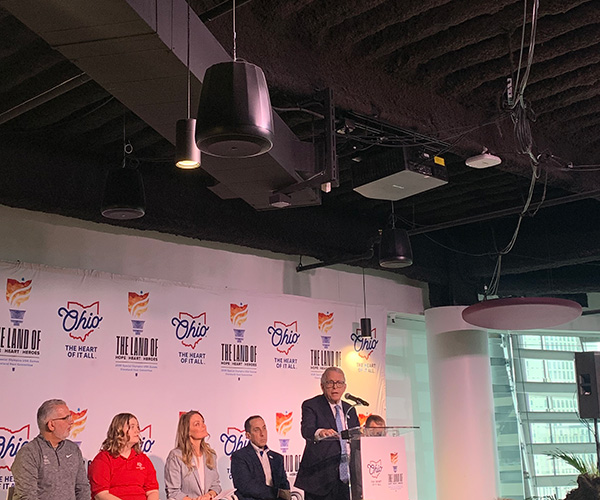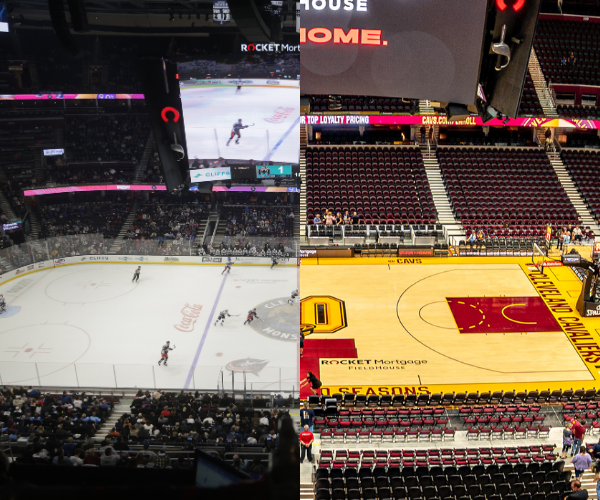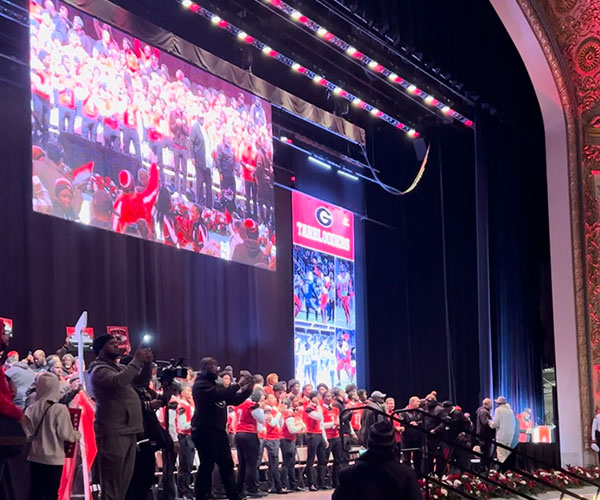|
|
LeBron James has a weak handshake. Close your eyes and you can almost imagine someone soft on the other end. Light and quick. Our palms do not touch. This is not the handshake one expects from 240 pounds of muscle. Nor is it the confident greeting someone who aspires to be the wealthiest man in the world.
The mind races. Perhaps he’s sick of people joking about how big his hands are. Perhaps he doesn’t want to crush less powerful appendages. Perhaps he’s weary of reporters like me analyzing his every move. This shake is perfunctory — a stopover between practice at The Q and a 20-minute flight to Columbus to tape a segment on “The Daily Show with Jon Stewart.”
While waiting to interview LeBron, I chat up Brian Windhorst, an Akron Beacon Journal reporter who has been covering James since he was a 14-year-old phenom. He asks what I’m doing. I tell him I’ve been promised 10 to 15 minutes to interview LeBron.
The mind races. Perhaps he’s sick of people joking about how big his hands are. Perhaps he doesn’t want to crush less powerful appendages. Perhaps he’s weary of reporters like me analyzing his every move. This shake is perfunctory — a stopover between practice at The Q and a 20-minute flight to Columbus to tape a segment on “The Daily Show with Jon Stewart.”
While waiting to interview LeBron, I chat up Brian Windhorst, an Akron Beacon Journal reporter who has been covering James since he was a 14-year-old phenom. He asks what I’m doing. I tell him I’ve been promised 10 to 15 minutes to interview LeBron.
“Congratulations!” he almost shouts. “He usually doesn’t give a crap about anybody who’s not national.”
LeBron has great respect for the people of Akron now, Windhorst says, but back toward the end of his high school years, he could be cocky, once even declaring that he’d never live in Akron because there wasn’t a house big enough.
Windhorst warns that if LeBron goes on autopilot (an almost inevitable consequence of doing dozens of interviews), I’ll get canned responses. “I always want to do my very best, but I try not to put too much pressure on myself,” he told Sports Illustrated (he was on the cover recently).
My plan isn’t to talk basketball, though. Because, believe it or not, that’s not the most interesting thing about the man. The fact that he is an astonishing talent on the court is well established. To debate whether he’s the best of this year, this decade or this generation is about as far as you can take that particular topic.
But what 22-year-old kid do you know aspires to be the richest man in the world? Who is studying Mandarin to help him get there? And who got on a plane and flew to Omaha, Neb., to ask a 76-year-old man for help achieving that goal?
Back to The Q. LeBron shakes hands with our photographers. (We’re doing the interview and the photo shoot at the same time.) He sits and, as the lighting is adjusted, I ask him if he was serious when he was quoted as saying he wanted to be the richest man in the world. He backs off — only a little.
“One of them. I don’t know if I can be the richest man in the world. Some people were born to a lot of fortune and fame. It’s just about maximizing my financial position.”
Which is what led him to study Mandarin. He just signed a three-year contract extension reportedly worth about $60 million with the Cavs, so it’s hard to declare that income secondary. But when you consider that he has more than $150 million worth of endorsement deals, it becomes obvious that his income and his appeal are on the same trajectory.
The more global he goes, the more the word “LeBron” is universally known, the more that trajectory will rise like he does approaching the rim.
And if you want more than a billion people in China to wear your shoes, it helps to be speaking their language. “You get a little bit more respect,” he explains. “You know, you add a little bit more fun.”
Can he say a phrase for us?
“I want to make sure everything is all complete before I start talking.”
Is he certain that his charm will translate?
“I’ve just got to be myself,” he says. “I can’t worry about if I’m going to win people over. That’s not how I look at things. I’ve just got to be myself, and hopefully I’ll win them over.”
Once you’ve got millions of dollars, what is it that makes you want to have billions?
Partially, says LeBron, it’s his competitive nature that just makes him want to be best at whatever he does. Partially, he’s looking ahead — way ahead. “The little money I’m making right now can’t last from generation to generation,” he explains. “I’m in a position now where I can make a lot of money for my family, for my son and for his kids and for their kids.”
So you build your appeal on the court, sell your sneaker in Asia, and it still might not be enough. To exponentially increase your money, you’ve got to invest. If you want to be the very best at investing, you’ve got to learn how to do it. So LeBron flew to Nebraska last fall to meet with Warren Buffet.
“You can learn something from a guy like that without him even saying anything,” LeBron says. “It was a humbling experience, to know that this guy came from nothing. I came from nothing. To be able to get to where he is now is unbelievable. Just like [Nike co-founder] Phil Knight. He was selling tennis shoes out of his trunk, now he owns a multibillion-dollar company. Guys like that, it humbles me as a person and a businessman.
“Thank God I’m young, and I’m learning early. As you grow as a businessman, you grow smarter. You know how to take risks and how to not take risks at times.”
It’s something LeBron enjoys doing. Math, he says, was his favorite subject in school. In fact, when asked what he’d be if he weren’t a pro athlete, he offers an image very difficult to conjure — LeBron, the accountant.
There’s another way for LeBron to increase his income — one that sends ripples of fear through any good Clevelander: Move to a bigger market, specifically New York or Los Angeles. One theory, which is hotly debated on hoops message boards, is that LeBron’s endorsement contracts have a clause stating that he’ll be paid more if he makes such a move.
Even if that’s not true, though, it’s largely a matter of common sense that the bigger a star LeBron becomes, the more he’ll be able to get from Nike and his other endorsements after his current contracts expire.
LeBron concedes that he could probably “do more globally” if he were based in a bigger market, but adds, “At the end of the day, I’ll broaden my global market as much as possible in Cleveland.” A clever way of saying he’ll do his best here, without ruling out an eventual move elsewhere.
We’re finishing up the photo session and, as he talks, LeBron chews gum and twirls the prop we brought (a basketball painted like a globe) around his waist. When you’re LeBron, your every move is interpreted to mean something, so I’ll equate this with his ability to multitask — he’s good on the court, in front of the cameras and even found time to get involved with a new housing project in Glenville through his development company.
Then, he drops the ball.
This is not typical of LeBron. If you watch television, you have by now seen the spots he did for Nike called “The LeBrons” in which he plays four different characters — himself, a teen version of himself, an older man and a flashy businessman.
How many tries did it take him to get the shot right?
“One.”
Silence.
“One,” he deadpans again.
The room erupts in laughter. LeBron joins in with his deep, joyful chuckle.
“Four days,” LeBron concedes. But not because he wasn’t a natural. He’s able to switch from character to character effortlessly, according to a Cavs staffer who witnessed some of the taping.
Later, Cavs owner Dan Gilbert adds, “LeBron is somewhat of an artist. He loves the creative stuff, whether it’s game presentation or the Nike commercial.” LeBron was very involved in creating the characters for the ad, Gilbert says. “It wasn’t just, ‘Hey, LeBron, say this.’ He’s that type of guy.”
Slate, which called LeBron a “talented performer,” actually noted that Michael Jordan — to whom LeBron is endlessly compared — could never have pulled off the concept.
LeBron asks if I need more time, then cheerfully invites me to walk with him, gesturing with his hand for me to follow. We leave the room used for the photo shoot, turning corners, walking down hallways, taking the elevator. I’m trying to give the man some distance, but he’s such a close walker (and I have no idea where we’re going) that I actually bump into him a couple times. It’s surprising. Given the hordes of people who want a piece of him, you’d think he would crave space. But he walks close, perhaps out of respect for the tape recorder I’m holding. Perhaps because he’s just a friendly guy. Perhaps he’s learned that it is actually pretty intimidating to be standing next to this incredible combination of muscle, power and stature. The thought prompts a question.
Does he ever get nervous?
“Nah,” he says. “I don’t.” He’s not being arrogant. Just matter-of-fact. You can tell by his follow-up statement, which is more teddy bear than tough guy.
“I still get jelly beans or butterflies in my tummy before the game, but it’s more of an excitement. You get nervous when you think you might fail.”
In other words, LeBron does not think he will fail.
I sense we’re closing in on the end of our walk, so I bring up the topic that the Akron Beacon Journal reporter warned me LeBron tries to keep private — his family. According to that reporter, LeBron refers to the mother of his child, LeBron Jr., as “wife.” “If you live with a girl, she’s pretty much your wife,” Windhorst remembers LeBron saying.
Through the Cavs’ PR department, LeBron’s girlfriend said she was “uncomfortable” being interviewed, even if we limited the scope of our questions to LeBron Jr.
LeBron, however, was happy to talk about his son, who just turned 2. Little LeBron’s favorite things to do are to eat and to play basketball. “I never gave him a basketball,” LeBron points out. “I just put a hoop in the house and a basketball, and he took off from there. That’s all he wants to do.
“And he uses the big ball, too. It’s crazy.”
Later, I find out that LeBron Jr. can dribble a full-sized basketball using two hands while walking. For those not familiar with the motor skills of toddlers, it’s a fairly impressive accomplishment.
When asked his favorite thing to do with his son, LeBron says, “Just to be able to spend almost every day of his life with him, you know. It’s something I didn’t have. You don’t know the fulfillment of a father until you become one.”
Even LeBron, though, can get worn out by the antics of a 2-year-old.
“Oh, yeah, yeah, yeah,” he says. “My mom says he has a little bit more energy than I did when I was that age.”
It’s now been 16 minutes and 58 seconds since LeBron shook my hand — a huge amount of time to have with someone like him the day before the season starts. We’ve reached the exit he takes to get to his car, and he’s paused to answer my last few questions, putting his foot on a ledge and taking the moment to stretch. He mumbles an apology that he has to go, but he’s “got a lot of business I have to do.”
I’d like to write what everyone in Cleveland wants to believe, that not only is he the Most Interesting Person on the Planet, but that he’s a nice guy, not ruined by fame.
Obviously, LeBron has something to gain by being nice to the media. So before I leave The Q, I make a point of asking a few people I see about him — an intern who works in the offices, a security guard, a guy mopping the floor and the pretty blond girl who appears on the JumboTron during games.
Everyone but the blonde, it turns out, has met LeBron.
“He’s a pretty good, downright guy,” says the janitor, pausing his mopping for a moment. “Pretty cool.”



